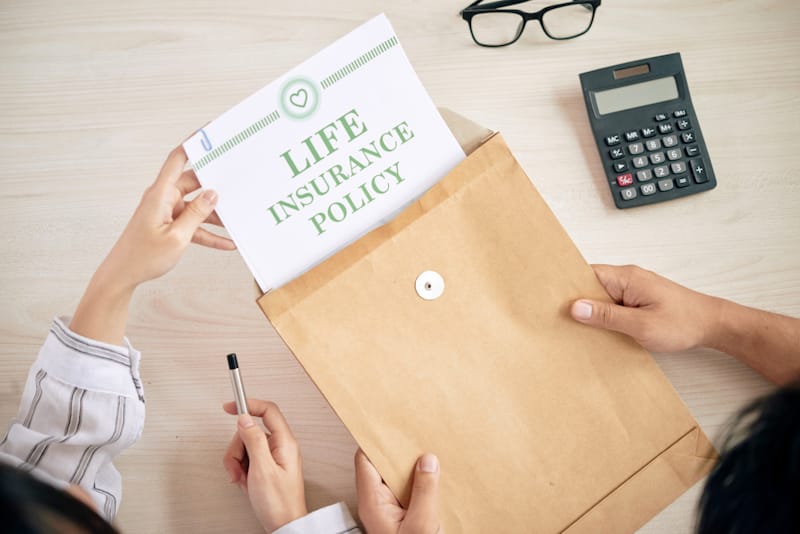There’re different life insurance policies, and you should purchase one suited to your individual needs. A life insurance policy can have many benefits, such as the payout received is tax-free, covers one’s funeral expenses, and can add to your retirement savings. But it might be a waste of money if you buy the cheapest policy that doesn’t benefit you or forget to pay your premiums or borrow more than needed from your policy. The pros and cons of a policy depend on your purchasing decision. Alternatives include creating a savings account, annuities, or having a pension scheme. You don’t have to buy life insurance as there are policies targeted to specific requirements for individual needs.
When it comes to investing your hard-earned money, buying life insurance seems like a total waste to many people.
People have this bias against life insurance that it’s only meant for the wealthy, and only they can benefit from it. They would instead use or invest their money somewhere it shows an immediate result.
The life insurance industry is much broader than people realize, where almost anyone can get it in a way that benefits them personally.
It’s not just money your beneficiaries get after your death, but there could be hidden benefits if you take a closer look.
What is life insurance?
Life insurance is a contract between the insurer and a policy owner. The policy guarantees a sum of money to be paid to the beneficiaries upon the insured’s death.
The insured need to pay monthly premiums in intervals to make that happen. The beneficiaries will get this payout upon the passing away of the insured.
It’s a good idea for those leaving a dependent family behind as their family will have financial support after their death, but it might not be such an appealing idea to everyone.
After all, it’s not insuring your life, and it can’t save you, so why would you want to invest a lot of money into something that will only benefit you after your death?
People believe it’s something only wealthy people can afford.
Those making ends meet in great difficulty don’t know how it can benefit them or what policy would be right for them.
Types of life insurance policies

Whether life insurance is beneficial depends on the type of policy and your individual needs.
Broadly they’re of two types:
Term life insurance policy
A term life policy can be described as insurance for the short-term needs of a person and lasts a certain number of years and then ends.
The insured gets to choose the period for which they want to take out the policy, and it can be for 10 to 20 or 30 years.
Permanent life insurance
As the name suggests, this insurance policy is for the insured’s whole life term, making it more expensive than term life.
It ends when the premiums are stopped, or the policy is surrendered.
5 Pros of life insurance
The most common reason people avoid getting life insurance is the high cost of giving premiums for the insurance. But there’re various benefits one can take advantage of:
1. Tax-free
One pro of insurance, the payout money is tax-free. The beneficiaries will receive a lump sum when the insured dies while the policy is still in effect.
They don’t need to report the amount, and they won’t be taxed on whatever amount they receive when filing taxes.
2. Securing your family’s future
With this payout, you’re securing your family’s financial future.

It’s recommended to have life insurance equal to 7 to 10 times your annual salary to directly benefit your family (beneficiaries).
As someone who’s the sole breadwinner of the family, their family, including their partner and children, can benefit from this payout.
3. Funeral expenses
Funerals and burials can be pretty expensive, and that’s something you don’t want to save your money on. The funeral cost was $7,848 as of 2021.
Since Americans don’t believe much in savings, even paying for the funeral can be a significant financial burden for the immediate family members.
Life insurance can easily take care of this emergency expense.
4. Coverage for chronic or terminal illnesses
As I mentioned before, life insurance policies can be personalized according to individual needs.
If you have an addictive habit such as smoking, it makes more sense to take life insurance and add or enhance your policy to cover death under certain circumstances.
These endorsements are known as riders, where you can personalize your policy by adding certain things to it.
Those policies covering a terminal illness can help the insured take the death benefits while still alive to pay for expenses.
5. Adding to your retirement savings
An insurance policy isn’t only to benefit upon the insured’s death but can also help add cash value to your retirement savings.
Getting a whole, universal, or variable life insurance policy can add cash value.
You can use this amount to get a car and a down payment on your new house, and you can use this amount after your retirement.
Cash value life insurance is also more expensive than term life insurance.
5 Cons of life insurance
There could only be cons when you don’t know which life insurance best suits your individual needs. In such cases, people end up making wrong investments.

Any significant life decision such as getting married, having a baby, or buying a car or house requires revising your current investments.
These are the following mistakes you can make:
1. Buying a cheap policy
Just because buying life insurance is something you heard is a good decision doesn’t mean you rush into buying the cheapest policy.
When you fail to consider what you’re getting in return in terms of coverage, policy buying can be a total fail.
Learn about various policies, their features, and how they can benefit you and your beneficiaries.
It’s common for people to make a mistake that isn’t so beneficial and end up with a policy because the premium is cheaper.
2. Lapsing premiums
Be mindful of paying life insurance premiums in the interval. Some policies are quite time sensitive, and failing to pay your premiums can make you lose your guaranteed policy.
A policy purchased to cover 100 years will only provide protection to age 92 if you end up missing one payment.
It’s best to check with your company if they allow late payment without changing anything in the policy before investing in it.
3. Forgetting insurance is an investment
A variable life insurance policy is a type of permanent policy that provides life insurance protection with cash value.
If you have this insurance policy, you have to treat it as an investment because a part of your premium goes toward life insurance and others into a cash value account. Its often used as a source of funds to supplement their retirement income by people.
Providing sufficient funds and giving premiums on time can help maximize the growth value of this insurance policy. Paying less will automatically impact the cash value available for the future.
Keep monitoring your accounts and rebalance if necessary to avoid taking more risks than you originally planned.
4. Borrowing from policy
There’re term and permanent life insurance policies. While there’s no cash value attached to short-term policies, it’s attached to long-term ones, which acts as a source of funds when people need to borrow money for a big financial decision.
While it’s a benefit and definitely considered a pro, it can become a con if people fail to manage this borrowing.
Taking out too much money can be a con if your policy lapses or runs out of money. Then all the money taken out will become taxable which wasn’t before.
Also, you’ll reduce your death benefits significantly to your beneficiaries.
5. Delaying buying an insurance policy
If you’ve sufficient income and a risky livelihood with family members dependent on you, investing in a life insurance policy is good.
It doesn’t make much sense to get an insurance policy for your children dependent on you or the elderly with little life span left.
It’s a great decision to invest in an insurance policy in your 20s and 30s, as it can prove much more beneficial.
It’s a great commitment, and finding out your different policy options and learning how they can benefit you is something you need to do before investing.
Alternatives to life insurance

- You can create a savings account, but there’s no limit to using a certain amount of money.
- Annuities are savings accounts offered by life insurance companies. In the future, they can turn into a lifetime stream of income.
- Social security.
- Invest your money elsewhere.
- Income protection insurance pays a regular tax-free income to the insured who’s off work due to an illness or an injury. It doesn’t pay out on death.
- Critical illness cover provides a tax-free lump sum payment after diagnosing a potentially life-threatening illness. It doesn’t pay out on death.
- Mortgage protection insurance is strictly for paying off the mortgage.
- Companies offer life insurance to employees when they’re employed. The death in service is a benefit that pays out when the firm employee passes away due to any circumstance.
- The prepaid funeral plan covers the funeral and burial costs, which are quite high as of 2021.
- Accidental death insurance covers an insured person against a fatal accident.
FAQs
Do I need life insurance?
It depends on your individual needs, as the primary function of life insurance is to provide the beneficiaries with financial support after the insured’s death. If you think you fall into the following category, you should consider buying life insurance coverage:
– Parents with minor children
– Parents with special needs adult children
– Adults who own property together
– Seniors with adult children
– Stay at home spouses
– Young adults whose parents took private student loans for them
– Young adults who just became independent
– Wealthy families who expect to owe estate taxes
– Families who can’t afford funeral expenses
– Businesses with key employees
– Married pensioners
– Terminal illnesses or a preexisting health condition
Can I get my money back if I cancel my life insurance?
You can’t get your money back once you buy a policy, and it doesn’t matter how many premiums you have paid.
Life insurance aims to get a payout when the insured dies to help their beneficiaries provide financial support. Different policies work in different ways, which have different benefits.
Is life insurance an investment?
Life insurance isn’t an investment in the conventional sense, and it helps your beneficiaries get financial help from when you’ve passed away.
It depends on the kind of policy you choose to purchase and what benefits it gives you.
Permanent life insurance has a cash value component that can be beneficial when you’re still alive.
To summarise
Life insurance can’t be a waste of your money if you decide to purchase a policy that meets your current and future goals and needs.
The earlier you invest in a policy, the more affordable the premium rates will be. If you end up with the wrong policy, it can seem like a waste that won’t provide you with your benefits.
Do your research on different policies and companies that provide them before purchasing and understand your contract before signing.
If no life insurance meets your needs, there’re always alternatives that might suit you.


